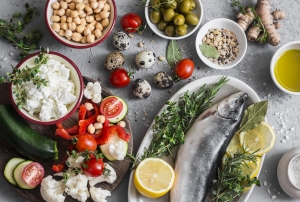WINTER IS COMING
 You don’t need to be a GOT fan to know winter is well and truly here! It’s freezing which can only mean it’s colds, coughs and infections season.
You don’t need to be a GOT fan to know winter is well and truly here! It’s freezing which can only mean it’s colds, coughs and infections season.
There are so many factors that can make us susceptible to getting sick this winter; chronic conditions, age, pregnancy, stress and our immune status changes due to these variations and seasons.
Did you know? That our gut microbiota has an influence on regulating the body’s immune system!
Our gut represents over half of our immune system.
Our GI tract is vulnerable due to encountering foreign pathogens via food antigens.
Stressed out at work? You’re probably reading this and saying who isn’t? If we have high cortisol levels (which is an indicator of physical or psychological stress) we are at an increased risk of getting coughs, colds, and infections this winter. Stress weakens our immune system and decreases the natural killer cell activity (our defence against viral infections).
WHAT TO DO THIS WINTER?
1. Probiotic Supplements
Probiotics don’t alter the gut microbiota but can alter the functions and thus the behaviour of your immune system.
For healthy individuals looking to increase immunity this winter look for a probiotic containing the strain Lactobacillus casei Shirota (LcS) or Bifidobacteria. LcS has been associated with increasing immunity in the elderly by improving microbial diversity and reducing constipation and diarrhoea episodes. LcS has been associated with reducing the prevalence of common colds and upper respiratory tract infections and duration.
Always check the product label, which should show the name of the probiotic strain (as probiotic effects are strain specific) as well as the live count of strains. It is important to stay on a probiotic for at least 1 month and monitor symptoms.
(Do not take a probiotic if immunocompromised)
2. Functional Foods
If you’re not a pill popper, the great news is that fermented foods contain live micro-organisms related to probiotics, however there is little evidence to show how fermented foods are affecting the microbiome. They are found in:
- Fermented dairy, such as live yoghurt and milk (can contact manufacturer about strains)
- Miso
- Dry fermented sausage
- Kefir
- Sauerkraut
- Kimchi
- Kombucha
- Fermented Pickles and cabbage
 3. Prebiotics & The Mediterranean Diet
3. Prebiotics & The Mediterranean Diet
There definitely can be a lot of confusion between probiotics and prebiotics. Probiotics are live micro-organisms and when administered in adequate amounts have health benefits (WHO). Prebiotics promote the growth of good bacteria thus producing health benefits.
Prebiotics are not necessary if you’re eating a balanced diet based on the Mediterranean diet, as this diet increases gut diversity which is an indicator of good health. The Western diet has been associated with decreased gut diversity due to low fibre and high saturated fat and sugar intakes. However, our diet can alter the gut microbiome by increasing fruit & vegetables, nuts, seeds, wholegrain carbohydrates and reducing red and processed meat consumption with oily fish and legumes.
4. Vitamin D
Vitamin D is insufficient in the UK diet due to low UV exposure in the winter months. An optimal Vitamin D status is important for immunity as deficiency has been linked with an increased risk of infections. Therefore, a 10mcg (400IU) Vitamin D3 supplement is recommended between October and March.
So be winter ready with a diverse Mediterranean diet which should include prebiotics and a Vitamin D3 supplement. Combined with probiotics whether it is in the form of fermented food, supplements or a cultured yoghurt which will provide you with a defence against common colds this winter.
You can find Séanín on instagram @sms_nutrition or contact Séanín via email, seanin2992@hotmail.com
About Séanín



Leave a Comment: